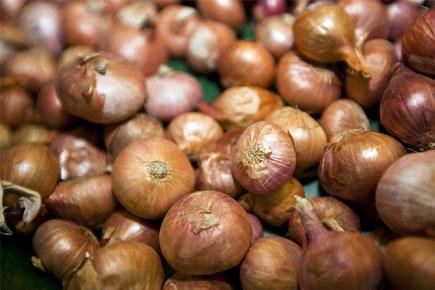After the theft of 700 kg of onion from a Mumbai shop, robbers have now decamped with about 2,000 kg of the pricey kitchen staple from the godown of a Nashik farmer

Nashik: After the theft of 700 kg of onion from a Mumbai shop, robbers have now decamped with about 2,000 kg of the pricey kitchen staple from the godown of a Nashik farmer.
ADVERTISEMENT
Abasaheb Pawar, a farmer from Pimparkhed village in Nandgaon taluka, yesterday lodged a complaint that 20 quintal stock of onions stored in his 'kanda chawl' (storing place) was stolen, Nandgaon Police said today.
A search has been launched for the onion stock, they said.
Meanwhile, the traders, specially from Jain community, today decided to keep onion auctions closed at Lasalgaon and Pimpalgaon Basant Agriculture Produce Market Committees (APMCs).
The decision to keep the auctions closed was taken in view of the Jains challenging in Supreme Court the order of Rajasthan High Court related to 'Santhara', the community's centuries old ritual of voluntary fasting to death, Nashik district onion traders association president Sohanlal Bhandari said.
In view of this, the onion auctions at APMCs in Lasalgaon, Pimpalgaon, Nashik, Dindori, Kalwan and Yeola remained closed today.
However, auction in other small APMCs will be held later in the afternoon, sources said.
The wholesale onion prices had last week touched Rs 57 per kg at Lasalgaon in Maharashtra, Asia's biggest onion market, raising the possibility of further spike in retail prices in most parts of the country adding to consumers' woes.
Also read: Mumbai-Case of onion theft registered with Wadala Truck Terminal
In the price-sensitive Delhi market and some other parts of the country, retail onion prices have already gone up to Rs 80 per kg depending on the quality of the crop.
In spite of several government measures, the prices of onion have increased unabated both in the wholesale and retail markets in the last few weeks due to tight supply following
shortfall in domestic output.
Also, the likely fall in this year's kharif (summer) crop due to deficit rainfall has further added fuel to the price rise.
 Subscribe today by clicking the link and stay updated with the latest news!" Click here!
Subscribe today by clicking the link and stay updated with the latest news!" Click here!






